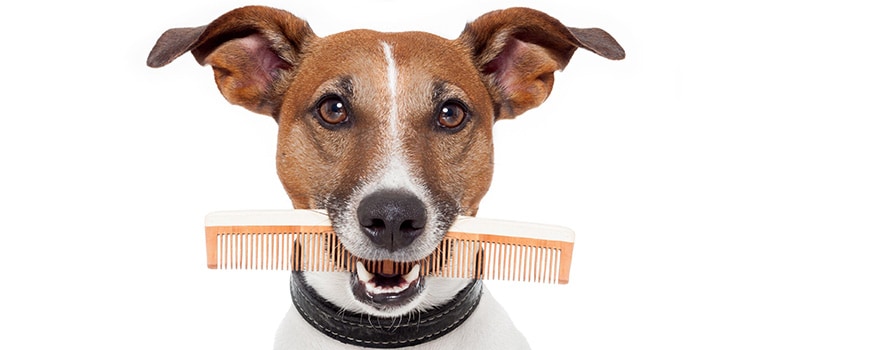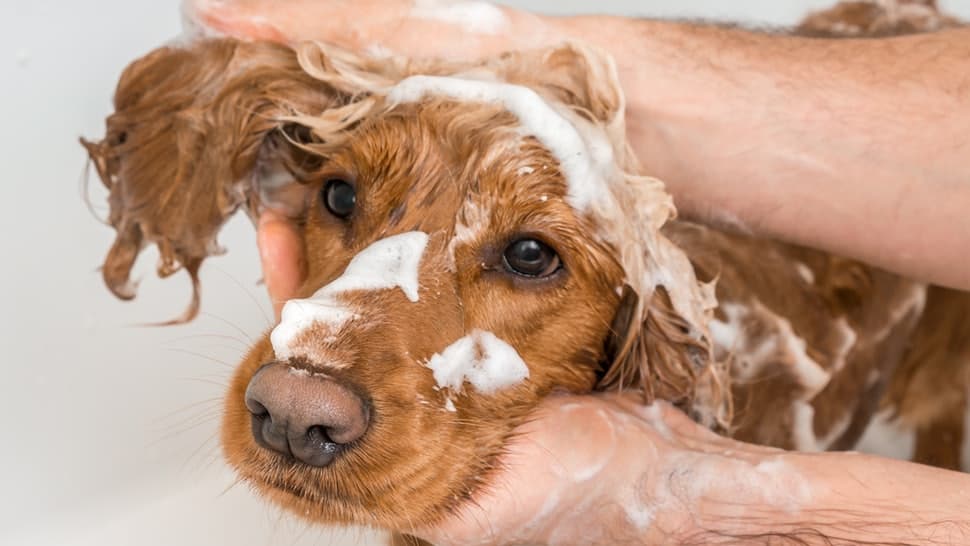Choosing which shampoo to use depends on how often you plan to bathe your dog. If you are bathing the dog often—once a week or more—then a mild shampoo would be best. Your decision when shopping for dog shampoos should also depend on what condition the skin and coat of your pet are in at that particular time.
Most groomers have a plethora of shampoos and conditioners to choose from so they can select what is best for the dog they are working on. There is a huge selection of different shampoos on the market made specially for dogs, so making the right selection can be somewhat a daunting task.
If your dog is bathed only when needed, a stronger shampoo will help. The longer dogs go between baths, the oilier the skin is. Stronger shampoos will help dissolve the oils and your dog will get cleaner faster. You can use ultra mild shampoos on a dirty dog, but it will take more shampoo and you will have to shampoo the dog more than once to get him clean.
Think of yourself—what do you choose when you shop for shampoo? If you have normal hair and scalp, then you can use anything. If you have dandruff, you need a medicated shampoo. If you have extra oily hair, you will need something that will remove more oil and you may need a very light conditioner or none at all.
If you have really dry or damaged hair, you need something to add more moisture. If your hair is thin and wispy, you may want something to add body and volume. Choose dog products the same way—based on the look you want and the needs of the skin and hair.
What Ingredients Are In a Dog Shampoo?
Most shampoos have a base consisting of one or two detergent surfactants, foaming agents, a foam stabilizer, emulsifiers to keep the ingredients mixed, thickeners, moisturizers, fragrance, preservatives, and colorants. To this base, featured ingredients or additives are added to give each product its unique character or image.
Botanical additives yield a product that can be marketed as natural or can create a spa image; extra humectants, or moisturizers, comprise a moisturizing shampoo; and if the shampoo is medicated, different ingredients will be added to help relieve itching, seborrhea, and a host of other problems.
Determining the actual ingredients in a pet shampoo by reading the label can be hit and miss. Although there are a few pet shampoo manufacturers who are beginning to disclose ingredients, most pet products contain no ingredient list or only a partial list that emphasizes the additives or special ingredients and tells little or nothing about the shampoo base.
Manufacturers consider what goes into their products trade secrets. Withholding ingredients doesn’t make them bad or their products suspicious; in fact, some of these manufacturers put as much research into their product formulations as any of the top human product manufacturers. You cannot make any assumptions about the quality of the products that withhold ingredient information.
This situation leaves the consumer to choose products on the basis of marketing information. Focus the decision by choosing a product that suits the skin and coat of the individual pet or offers the desired results.
Special Shampoos
If your dog is very sensitive and has dry skin, you need to use a very mild shampoo with conditioner. If your dog is very dirty or oily, you will need a stronger de-greasing shampoo to get the job done. If your dog has skin conditions such as yeasty skin, Schnauzer bumps, or seborrhea, you may need a medicated shampoo.
Tearless shampoos are great for cleaning faces of dogs and for the entire body of puppies who are usually wiggly and tend to get shampoo in their face. You may also consider placing a nonprescription, mild petrolatum-based ophthalmic ointment in the eyes prior to shampooing.
Tearless Shampoos
Tearless means less tears, not necessarily no tears. Tearless products have a milder primary surfactant that is less likely to irritate the sensitive eye tissues. Contrary to popular belief, tearless shampoos do not contain numbing agents. Tearless shampoos usually use less aggressive detergents that do not attack the protein of the eye.
They may also include ingredients that serve as a counter irritant to the primary detergent, reducing the possibility of irritation. This mild shampoo is also great for using on dogs that you bathe frequently that do not have dirt and oil build up. If your dog is really oily or dirty this would not be the best shampoo to use, except on the face.
Basically, tearless means a supermild shampoo that won’t remove oil. It’s okay to use for frequent bathing or on faces, since the surfactant, or cleaner, in it is so mild it rarely causes eye irritation. Even so, always flush the eyes when you rinse the dog.
Hypoallergenic Shampoos
Hypoallergenic doesn’t mean that your dog won’t be allergic to it; it means there is less chance it will cause an allergy. Hypoallergenic shampoos are not necessarily mild. The nature of the detergent, whether it is harsh or mild, is not related to allergic reaction.
Most often, hypoallergenic shampoos are formulated with little or no fragrance and colorants. To be more seriously hypoallergenic, a formula should also not contain botanical or protein ingredients. Unfortunately, there is no industry definition for this term. Many—but not all—hypoallergenic shampoos are also tearless. Even if they are, if you get any shampoo in the pet’s eyes, be sure to flush them thoroughly with water for a few minutes to remove all traces of shampoo.

